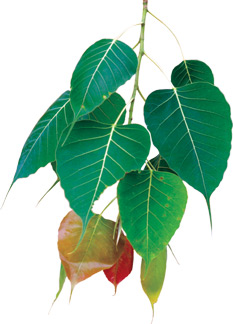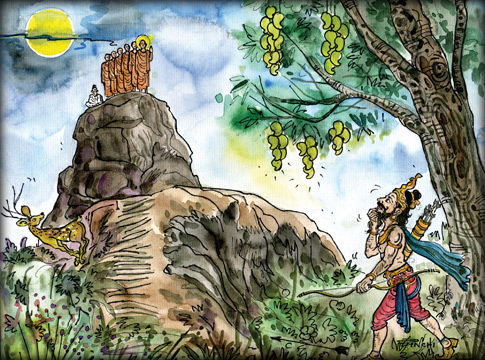 Poson, a spiritual heritage Poson, a spiritual heritage
By Kalakeerthi Edwin Ariyadasa
“Buddha was the
embodiment of all the virtues he preached. During his successful and
eventful ministry of 45 years he translated all his words into action;
and in no place did he give vent to any human frailty. The Buddha’s
moral code is the most perfect which the world has ever known”
-
Prof. Max Muller, German scholar.
The Poson season, rekindles spiritual fervour. In a way, religious
zeal is much more pronounced during Poson than perhaps during the Vesak
festival. Ubiquitous decorative displays, multi-hued pandals, narrating
religious tales in alluring pictorial arrangements and the illuminated
vistas, lead Vesak to an emphatic carnival atmosphere.
In the days of Poson, the focus seems to shift, at least minutely.
Arrays of people in subdued white religious clothes, assemble and move
around in well-disciplined throngs.
Pilgrimages and spiritual observances are more extensively indulged
in than during Vesak. The religious masses are drawn to issues relating
to the doctrine, the days of Poson with a perceptibly keener enthusiasm
than in the Vesak season.
Special adoration
 Although Vesak is the most predominant religious festival for any
Buddhist community in Sri Lanka, Poson receives a special adoration,
because of the memories associated with this specific period. Although Vesak is the most predominant religious festival for any
Buddhist community in Sri Lanka, Poson receives a special adoration,
because of the memories associated with this specific period.
The historical celebration of a ruler of this country, experiencing a
sudden spiritual transformation is deeply etched in the folk heritage of
this land. And the deep appeal of this compelling episode in the
evolution of the nation has enabled an unfading mythical halo to
surround it.
The miraculous and spiritual aspects of the formal introduction of
Buddhism to Sri Lanka have a way of exuding an undiminishing allure and
freshness in spite of endless repetitions.
The mystery of the friendship between Emperor Dharmasoka and the
ruler of Sri Lanka, Devanampiya Tissa, can never be fully fathomed.
What, in the first instance, persuaded Sri Lankan King Devanampiya
Tissa to gift the precious treasures, that mysteriously appeared in this
land, to his unseen friend Emperor Dharmasoka of India?
Reason
Then again, what really was the reason that prompted Emperor Asoka,
to arrange a consecration of King Devanampiya Tissa.
Then comes the religious mission sent out by the Emperor to Sri
Lanka. The Emperor directed an array of religious dignitaries to take
the message of Buddhism to various mighty nations.
But the missionary group sent as his personal spiritual emissaries
was largely a chosen few, dominated by the emperor’s closest kith and
kin.
The mission was headed by his son Arahat Mahinda. Bhikkhu Sumana, the
son of the emperor’s daughter Sanghamitta, was also included in the
group of emissaries. The lay devotee Bhanduka, who also came along, was
the emperor’s grandson.
This seems to deepen the mystery. The emperor sent along a group,
made up of people near and near to him.
Mystery
But the mystery is not over yet.
Eventually he sent along his own daughter Bhikkhuni Sanghamitta,
bearing a sacred gift. This is a sapling of the sacred Bodhi tree, in
the shade of which ascetic Siddhartha achieved Supreme Enlightenment.
Ven. Bhikkhunis Sangamitta was accompanied by people skilled in a
vast range of arts and crafts. These too were part of the emperor’s
domestic retinue, who attended to various allotted tasks, rites and
rituals.
The outcome of all this is an inescapable reality.
Heritage
The emperor endowed upon Sri Lanka a unique Buddhist heritage.
In the course of Sri Lanka’s long history, our rulers, safeguarded
this heritage, imparting to it a royal dignity in addition to its high
spiritual grandeur.
This Buddhist tradition, possesses events and personalities, that
have a universal stature.
One specific ruler who made a tremendous contribution not only to
Buddhism and to the cultural traditions linked to it, back to the
totality human culture was King Valagamba (Vathagamini Abhaya). His rule
had a double tenure. At first he reigned from 43 B.C. for a brief
period.
In the segment of his reign from 29 to 17 BC he had the Sangha
community of Sri Lanka to commit the teachings of the Buddha into
writing.
This symbolises a grand event in the whole history of human culture.
This is an outcome of the institution of Buddhism to Sri Lanka,
during the days of King Devanampiyatissa in a Poson season.
While, remembering that sacred Poson event, we must turn our
unflagging attention to the need to safeguard the heritage of Poson. One
specific move is to make a thorough study of the writing down of the
oral tradition of the Buddha’s dispensatia.
As a noble Poson duty, Sri Lankan Buddhist leaders could persuade a
group of scholars to make substantial and comprehensive study of the
epic episode of the committing of the Buddha wow with writing here in
Sri Lanka.
If this is not done urgently, a Sri Lankan event that adorned world
culture, will totally fade from memory. |

